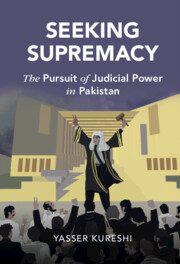Book contents
- Seeking Supremacy
- Cambridge Studies in Law and Society
- Seeking Supremacy
- Copyright page
- Dedication
- Contents
- Figures
- Tables
- Acknowledgements
- Introduction
- Chapter One The Judiciary, Rule of Law and the Military
- Chapter Two The Loyal Court (1947–1977)
- Chapter Three The Controlled Court (1977–1999, Part 1)
- Chapter Four Between the Barracks and the Bar (1977–1999, Part 2)
- Chapter Five The Confrontational Court (1999–2017)
- Chapter Six Epilogue
- Chapter Seven Conclusion and Comparative Perspectives
- Appendix: Structure of the Pakistani Judiciary
- References
- Index
- Cambridge Studies in Law and Society
Chapter Seven - Conclusion and Comparative Perspectives
Published online by Cambridge University Press: 08 September 2022
- Seeking Supremacy
- Cambridge Studies in Law and Society
- Seeking Supremacy
- Copyright page
- Dedication
- Contents
- Figures
- Tables
- Acknowledgements
- Introduction
- Chapter One The Judiciary, Rule of Law and the Military
- Chapter Two The Loyal Court (1947–1977)
- Chapter Three The Controlled Court (1977–1999, Part 1)
- Chapter Four Between the Barracks and the Bar (1977–1999, Part 2)
- Chapter Five The Confrontational Court (1999–2017)
- Chapter Six Epilogue
- Chapter Seven Conclusion and Comparative Perspectives
- Appendix: Structure of the Pakistani Judiciary
- References
- Index
- Cambridge Studies in Law and Society
Summary
Since the third wave of democracy there is a growing recognition of the critical role the judiciary plays in the establishment and consolidation of democracy (Huntington 1991; Schepelle 2003; Gloppen 2004; Hirschl 2008). Today independent courts are seen as a critical component of liberal democracy and a necessary antidote to the rise of illiberal populism and authoritarianism (Bogg and Freedland 2018; Gardbaum 2015; Lacey 2019). But this commitment to judicial independence from external interventions, as a necessary check on the authoritarian instincts of political and military leaders, must be informed by a deeper understanding of the forms that external interventions into the judiciary can take, and the meanings judges ascribe to institutional independence. When will formally independent judges uphold liberal and democratic norms or challenge powerful authoritarian militaries? Similarly, when will independent judges wield their authority to undermine and displace democratically elected authorities? To answer these questions, we must pay attention to the processes that lead to the formation of hegemonic discourses and preferences within judicial institutions (Ocantos 2016).
- Type
- Chapter
- Information
- Seeking SupremacyThe Pursuit of Judicial Power in Pakistan, pp. 238 - 264Publisher: Cambridge University PressPrint publication year: 2022



